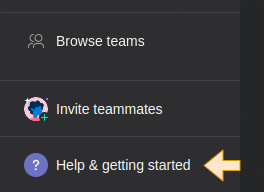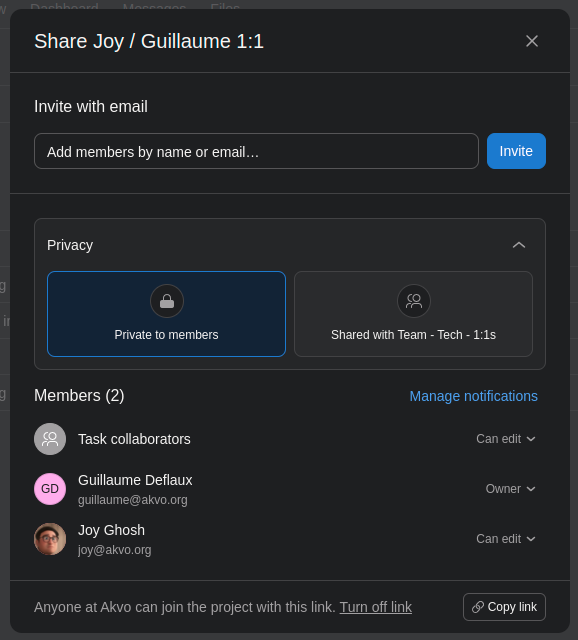Asana - Fundamentals
Asana Documentation
Getting Started With Asana
We highly encourage you to go through the Basic Course Series (1 hour commitment) in order to get a guided tour of the main features of Asana.
Asana Guide
The Asana Guide is very well written and comprehensive. This is the #1 resource you should use to explore functionalities further.
How To Asana
Many resources are also available on Youtube. We recommend looking at the How To Asana series to short and practical videos.
⚠️ Some videos can be a few years old. Although still relevant there might be other / better ways to do things in Asana (Ex: The time tracking video shows the Harvest integration. There's now a built-in time tracking feature.).
Inline Help
You can access the documentation within Asana itself by clicking the "Help and getting started" link at the bottom left of the screen.

Golden Rule
If you need to remember one thing, remember this:
A task is only considered actionable if it is assigned to someone and has a due date.
Important Concepts
Asana Organization
All users that have an @akvo.org email address are part of the Akvo Asana Organization.
Asana Teams
An Asana Team is a set of people that share projects. Think of Asana Teams as a way to group projects that are related to each other. Ex:
- Internal Asana Project for an internal team
- Asana Projects used to implement a client project / contract
Teams have different permission settings that control how people can find and join teams (projects have their own permissions).
| Privacy Setting | Accessible by | Can request to join |
| Membership by Request | Team members | Yes |
| Private | Team members | No |
| Public to organization | Team and organization members | Yes |
At Akvo, Asana Teams should have the permission "Public to organization" by default.
Asana Projects
An Asana Project is where you organize the tasks.
Useful Features
| Feature | Description |
| Invite Clients To Asana |
You invite clients to Asana. This is a great way to create transparency and to have them engage with the project. Client usually have access to the Timeline and Feedback projects. You can add share other Asana Projects with them depending on their role and level of engagement. 💡 As long as their email address is not @akvo.org their account does not count towards our Asana seat count. |
| Tasks can be in multiple projects | You can add tasks to multiple projects at the same time. This is very useful to avoid duplication. Ex: A task is added to te Feadback project by the client. You add that task to the Sprint Project as well so that the work of the team is is a central location. |
| Repeat / Recurring Tasks | Repeat tasks get created again when they are completed. This is useful to remind you to do something at periodically. Ex: submit your expenses every month. |
| Timeline View & Dependencies | The timeline view allows you to create Gantt charts. Timelines are a very convenient way to share project update with clients. |
| Everything that is assigned to you ordered in many different possible ways. | |
| Inbox is your notification center for Asana. Your inbox displays updates on projects you're a member of, and tasks that you collaborate on or that are assigned to you. It's a great way to stay on top of what has happened. | |
| You can create templates for Projects and Tasks. Great for standardizing your workflows. | |
| Useful to customize your Asana workflow and to add sort / filtering capabilities. Make sure to check whether the custom field you want to add already exists in the Akvo's field library. | |
| Rules allow you to streamline routine tasks and establish workflows with ease. For a rule to work, you need a trigger that activates the rule and an action that is performed automatically. For example, a rule can be created to automatically assign a task (action) when a due date is set (trigger). Workflows provide a nicer user interface to create and manage rules. | |
| You can create forms to standardize the way tasks are created in an Asana Project. Forms have an external link that can be shared with anyone, even without an Asana account. Ex: Create a form to collect bug reports. | |
| Proofing lets stakeholders leave specific, actionable feedback on images so your team knows what needs to be done to complete their work. | |
|
Approval tasks are tasks for which the "Completed" boolean attribute is replaced by:
Useful when you need more than just a simple Yes or No. |
|
|
Asana can be integrated with many other 3rd party tools. Here are some useful examples: |
|
|
For anything else that is not possible with an existing App Integration, you can still rely on Asana's API. Great combo with automation tools such as n8n. |


No comments to display
No comments to display